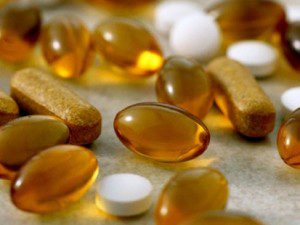By Cheryl Myers – livestrong.com
You can make wiser choices when purchasing vitamins by learning to identify synthetic dietary supplements from natural vitamin products. Manufacturers of dietary supplements sometimes use synthetic materials for increasing the vitamin’s potency and stability.
According to the Organic Consumers Association, some of these materials come from coal tar derivatives, the same toxins that cause throat cancer in tobacco smokers.
Before shopping for vitamin supplements, know what to look for in a vitamin product that may cause harm to your health.
[pro_ad_display_adzone id=”110028″]
Step 1
Search for words listed in the ingredients that begin with “dl.” When a word contains “dl” in the prefix, it is an indication that the vitamin is synthetic. As an example, “dl-alpha tocopherol acetate” and “dl-alpha tocopherol” are synthetic forms of vitamin E.
Step 2
Find words that end with “ate” or “ide” in the list of ingredients. These words indicate that the manufacturer used synthetic materials for increasing the vitamin’s potency and stability. Some words to look for include nitrate, acetate, sodium ascorbate, sodium benzoate, chloride, hydrochloride, silicon dioxide and titanium dioxide.
Step 3
Find the synthetic form of the vitamin listed under the ingredient list. Natural vitamins come from natural food sources. If you see the vitamin listed as the vitamin itself, such as “vitamin D,” then it is sure to be the synthetic version, according to Dr. Ben Kim, a Canadian chiropractor and radio show host. Look for food sources such as “citrus” instead of “vitamin C” or “parsley” instead of “vitamin K.”
Step 4
Identify the words “natural” on the vitamin bottle. If the bottle says, “100 percent natural” the vitamin supplement does not contain synthetics. On the other hand, a label that says, “natural,” might have at least some synthetic components. According to Earl Mindell’s “New Vitamin Bible,” only 10 percent of the product must come from natural food sources in order for a company to claim “natural” on the product’s label. If the product label does not say “100 percent animal-based” or “100 percent plant-based,” the supplement is synthetic.
Step 5
Look for the vitamin potency listed on the product’s label. According to the Organic Consumers Association, if the vitamin supplement has a high or otherwise unnatural potency, the product is synthetic. For example, a product that provides 1,000 percent of vitamin C is unusually high. This is ten times the amount you need daily, and an amount that even a healthy diet — consisting of natural, whole-food sources — cannot provide.
References
- Organic Consumers Association: The Synthetic Vitamin Milligram Game; Brian Clement; January 2007
- Dr. Ben Kim: Synthetic vs. Natural Vitamins
- “Earl Mindell’s New Vitamin Bible”; Earl Mindell and Hester Mundis; 2011
- Organic Consumers Association: Background Info on Synthetic vs. Natural Vitamins (Q&A); 2007
About the Author
Cheryl Myers’ first publication was in a local paper in 1989. Some of her works have appeared in “Guideposts,” “Body + Soul” and “Hearing Health Magazine.” Myers has an Associate of Science in nursing from Catonsville Community College.
[pro_ad_display_adzone id=”110027″]







